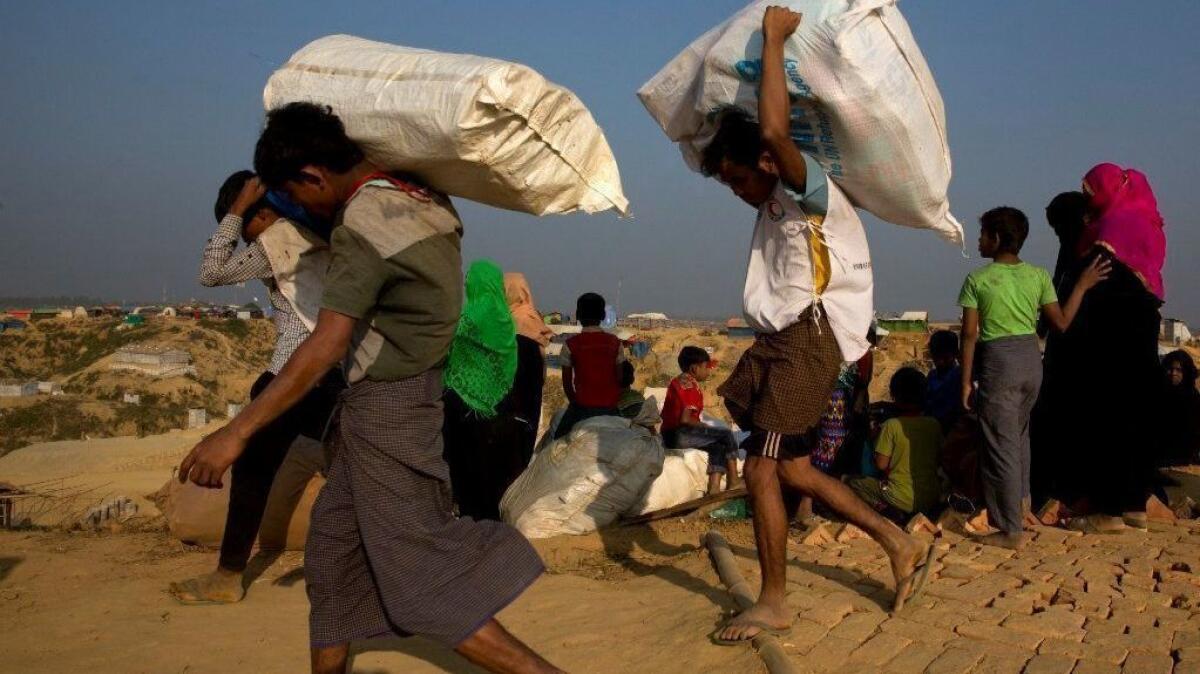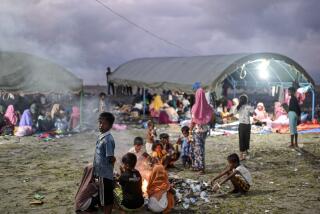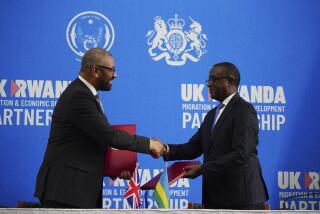Myanmar and U.N. agree on plan to repatriate Rohingya amid uncertainty over their safety

- Share via
United Nations agencies signed an agreement with Myanmar on Wednesday to support the return of Rohingya Muslim refugees, calling it a first step toward encouraging 700,000 people who fled government massacres last year to come back to their home country.
The U.N. agencies said the agreement was “aimed at creating conducive conditions for the voluntary, safe, dignified and sustainable repatriation of refugees from Bangladesh,” where they are crowded in makeshift, flood-prone camps.
The government of Myanmar, also known as Burma, said it would allow U.N. agencies access to parts of northern Rakhine state for the first time since August, when the army launched a bloody crackdown against Rohingya villages that the U.S. has described as ethnic cleansing.
While U.N. officials say it is too early for large numbers of Rohingya to return now, the U.N. refugee agency, one of the parties to the agreement, said it planned to assess conditions in Rakhine state and report back to refugees on whether it was safe for them to return to their places of origin.
The access, if granted, would potentially meet a demand of some refugees who insist they will not return to Rakhine without international bodies there to help ensure their safety. Many Rohingya who escaped to Bangladesh said Myanmar soldiers killed and raped their family members and burned their houses to the ground.
Advocacy groups said there was still far too much uncertainty in the agreement to persuade many Rohingya to return.
“If this agreement can help the U.N. access restricted areas, that’s good, but this doesn’t represent any fundamental change on the ground,” said Matthew Smith of Fortify Rights, an advocacy group.
“Rohingya know better. They aren’t lining up to return to where they just fled genocidal attacks.”
Among the concerns is that the Myanmar government led by Aung San Suu Kyi has consistently denied credible allegations of widespread atrocities collected by the U.N. and international human rights groups. Smith said the agreement with the U.N. was an attempt “to distract the world from mass atrocities committed by the army.”
Myanmar authorities have also failed to reassure Rohingya Muslims that they would restore their citizenship, which was stripped in a 1982 law that excluded the group from a list of 135 “national races” recognized by the predominantly Buddhist country.
The Rohingya, whose population was estimated at 1.1 million before the attacks, have long been denied freedom of movement and forced to live under an apartheid system, with many confined to internment camps and subjected to curfews.
The two-page memorandum the Myanmar government released Wednesday does not use the word Rohingya, instead referring to “displaced persons from Rakhine state.”
In the refugee camps in Bangladesh, Rohingya leaders say that many of those who remain in Rakhine — including some 120,000 confined to internment camps — have been forced to accept national verification cards, a government ID that omits their ethnicity and confers fewer rights.
“Those who are left are worried and they are being told they must accept” the cards, Rashid Alam, a village leader from northern Maungdaw district, said in an interview last month.
Kyaw Win, executive director of the London-based Burma Human Rights Network, questioned whether the government “has any sincerity to find a sustainable solution.”
“There are 120,000 Rohingya refugees still in [displacement] camps and living in an appalling condition,” he said. “Why doesn’t the Burmese government first return them to their homes and grant them their basic human rights including education, healthcare and freedom to move?”
Myanmar has promised and then withdrawn access to the U.N. before, most recently in December, when the government banned a top human rights official from visiting the country.
The government has also been criticized for dragging its feet after reaching an agreement in November with Bangladesh to begin voluntary repatriation of refugees within two months. In April, Myanmar announced that five members of a Rohingya family had returned to Rakhine – but Bangladesh said it had no information about the returnees and dismissed the move as a publicity stunt.
Many Rohingya say it is not enough that Myanmar allows them to return. They argue that the government must provide justice for the army’s victims – including untold numbers of women who were raped – and present a plan to restore damaged villages and rehabilitate survivors.
“We watched our people killed, my property looted and shop burned down. We have nothing left waiting for us,” said Katayatullah, a 43-year-old clothes seller from Bolibazar in Maungdaw district, who has only one name.
“I will go back if security forces do not kill us, and if our losses are compensated.”
Shashank Bengali is South Asia correspondent for The Times. Follow him on Twitter at @SBengali
More to Read
Sign up for Essential California
The most important California stories and recommendations in your inbox every morning.
You may occasionally receive promotional content from the Los Angeles Times.











